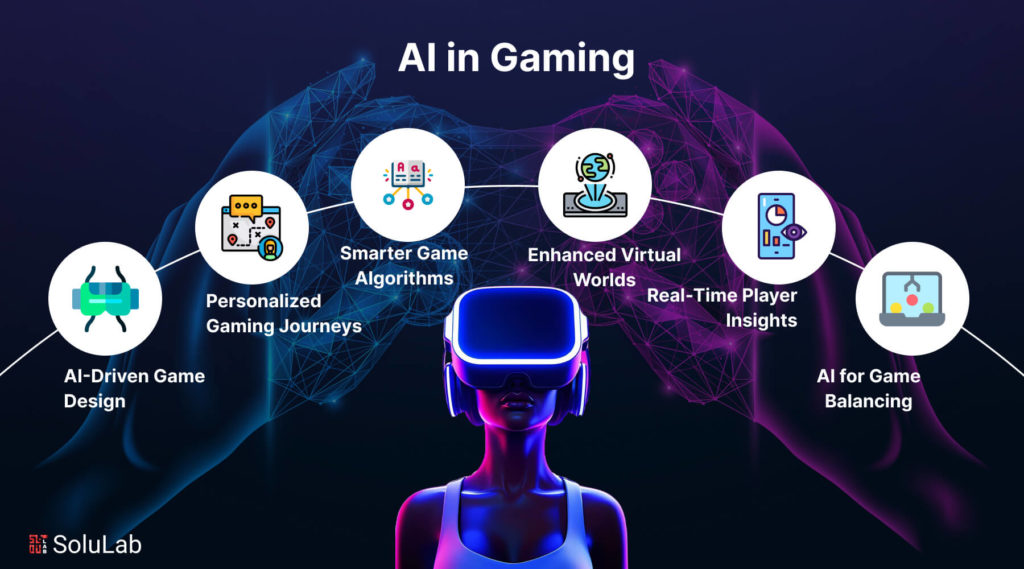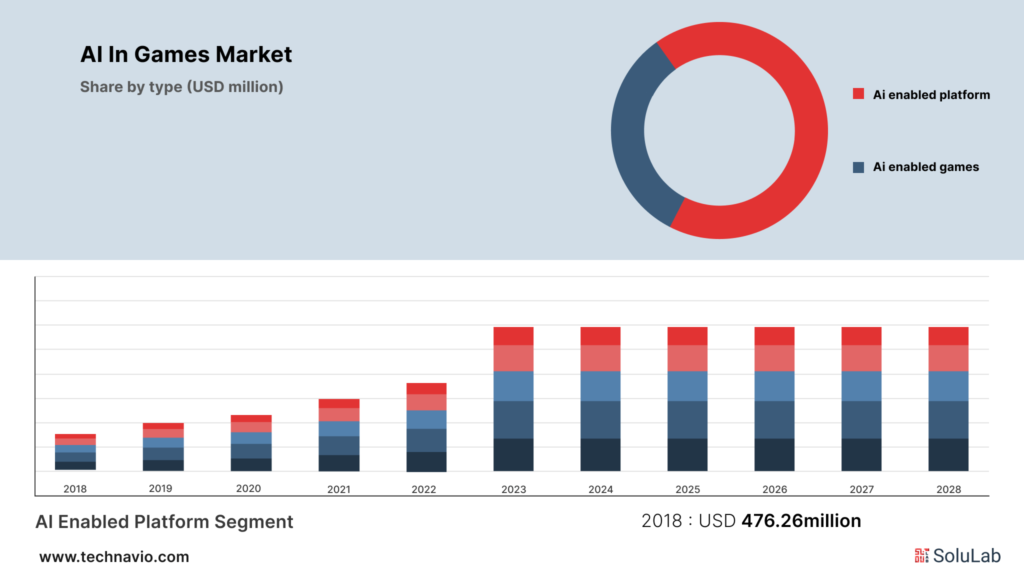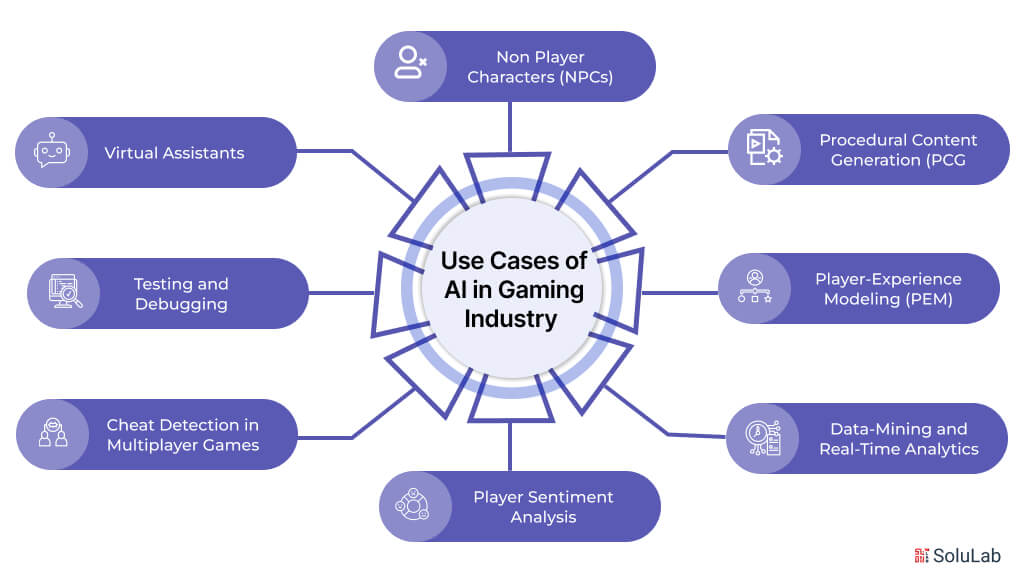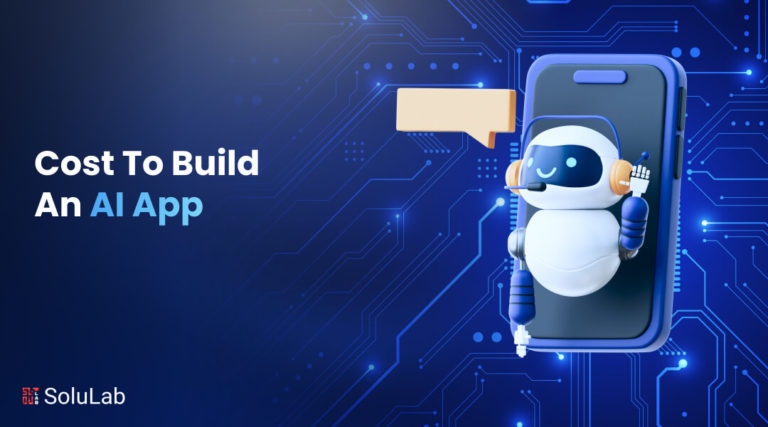
In the year 2020, online gaming experienced a remarkable surge as the global COVID-19 pandemic confined game enthusiasts to their homes, leading them to seek new avenues to fulfill their gaming desires. Though the initial growth trend has since stabilized, online gaming remains highly popular, boasting over 2.5 billion active gamers worldwide. As we look to the future, AI emerges as a transformative force with the potential to upgrade the gaming industry. NPCs (more details later) play a pivotal role in this transformation. According to Statista, by 2027, a staggering majority of residents in the US (64%) and UK (70%) are projected to be classified as gamers, reflecting the expanding significance of the gaming market.
In the gaming industry, the Artificial Intelligence (AI) market is projected to experience significant growth, with an anticipated increase of USD 4.50 billion from 2023 to 2028. This expansion is driven by several key factors. Central to this growth is the increasing adoption of Augmented Reality (AR) and Virtual Reality (VR) technologies. These immersive technologies provide enhanced gaming experiences, attracting a wider audience. Additionally, the proliferation of free-to-play models has increased accessibility and affordability, broadening the market’s reach. Furthermore, the gaming industry, with a growing population of millennials and Gen Z who favor digital and interactive experiences, is propelling the market forward. These factors combine to create a strong growth trajectory for the AI in Games Market.

What Is AI in Gaming?
AI stands for responsive and adaptive video game experiences. These interactive experiences are driven by AI-powered non-player characters (NPCs) that exhibit intelligent and creative behavior, resembling human players. AI serves as the engine that dictates an NPC’s actions and reactions within the game world. The future of AI in gaming is promising, as it is not a novel concept. However, in recent times, it has transcended its traditional role to become a transformative force that is reshaping both the process of game development and the interactive experiences players enjoy. AI-powered games progressively shift the control of the gaming experience toward the player, whose actions and choices contribute to finalizing the game’s narrative and outcomes.
In game design, AI procedural generation, also known as procedural storytelling, refers to the algorithmic creation of game data, replacing the traditional approach where each element is manually crafted by a developer. This technique allows for the generation of environments, characters, quests, and other game assets, resulting in unique and varied experiences with each playthrough.
In response to the burgeoning demand for gaming experiences, a myriad of startups and established enterprises have ventured into the virtual world, offering AI-driven gaming solutions and platforms. Significant investments in this sector underscore the growing influence of AI in the entertainment industry, particularly in games utilizing play-to-earn tokens.
For instance, in January 2021, Latitude, an AI app development company specializing in AI-generated infinite stories within video games, secured $3.3 million in venture funding. Osmo, an interactive play business, bolstered its growth prospects with a substantial investment of $32.5 million. Additionally, Gosu Data Lab, a Lithuanian AI gaming firm, garnered a notable $5 million in funding, aiming to analyze gaming data and enhance player skills through AI-driven insights.
These prominent examples illustrate the increasing prevalence of AI in gaming industry, emphasizing its advantages and potential to upgrade the industry.
Use Cases of AI in the Gaming Industry

The integration of AI in the Gaming Industry has been an interactive experience by crafting and adaptive gameplay. Non-player characters (NPCs) exhibit intelligent and imaginative behavior, mimicking human-like actions and decision-making. The future of AI in gaming is profound and continues to expand, transforming numerous aspects of gaming by enhancing engagement, adaptability, and responsiveness. Additionally, the rise of play-to-earn tokens is revolutionizing the gaming landscape, allowing players to earn real-world value through in-game achievements. For those who wonder how AI and video games intertwine, here are key areas where the uses of artificial intelligence in gaming are propelling the industry forward.
1. Non-Player Characters (NPCs)
One of AI’s most impactful applications is in the application of AI in gaming, particularly in the creation of non-player characters (NPCs). These NPCs exhibit intelligent behaviors that mimic those of real players, enhancing the immersion and dynamism of games. However, they are pre-programmed to follow automated rules that cannot be directly controlled by players. This allows for more realistic interactions between characters and players, resulting in a unique and personalized gaming experience for each individual.
Leading gaming companies such as SEED (EA) have recognized the potential of AI-enabled NPCs and are actively leveraging this technology. They utilize AI to train NPCs by simulating the behaviors and strategies of top players. This results in NPCs that can adapt and respond to players’ actions in a more natural and intelligent manner, creating a more engaging and challenging gaming experience.
2. Image Enhancements and AI Upscaling
AI has another noteworthy application of AI in gaming known as “AI Upscaling,” which focuses on enhancing visuals. The core principle behind this technique is the transformation of a low-resolution image into a higher-resolution one while maintaining a similar visual appearance. This remarkable technique not only revitalizes classic games but also empowers players to experience visuals and improved resolutions, even on older hardware.
NVIDIA’s DLSS technology serves as an exceptional example of AI’s capabilities in image enhancements. NVIDIA researchers have successfully implemented AI-driven upscaling in games such as “Cyberpunk 2077” and “Control,” resulting in higher-resolution graphics and improved frame rates. This advancement enables players to seamlessly navigate and alter scenes within these games, creating a truly immersive and visually stunning gaming experience.
3. Procedural Content Generation (PCG)
Artificial intelligence in gaming holds tremendous potential in PCG. It enables game developers to create richer and more diverse worlds by simplifying the complex process of game asset generation at an accelerated rate to meet users’ demands. Additionally, AI can generate interactive narratives based on past storylines.
For instance, AI Dungeon 2, a text-based adventure game, utilizes OpenAI’s GPT-3 language model to provide infinite adventures and possibilities. In AI Dungeon 2, players progress through the game by giving relevant prompts and directing AI to create unique storylines for their characters to interact with.
4. Player-Experience Modeling (PEM)
Artificial intelligence in gaming is exemplified by player experience modeling (PEM), a prevalent AI trend that mathematically simulates gamers’ experiences to forecast their preferences for enjoying or disliking a game. This AI analyzes players’ proficiency and emotional states to adjust the gaming mechanics. Based on gamers’ skill levels, AI can modify the game’s complexity in real time, tailoring it to their interests, thus enhancing interactivity and adaptability. This customization ensures a more engaging and immersive gaming experience that caters to individual preferences and skill levels.
5. Data-Mining and Real-Time Analytics
Every day, 2.5 billion gamers worldwide produce around 50 terabytes of data. This massive volume of data presents a significant challenge for gaming companies, as they must monitor it closely to identify opportunities and take proactive measures before players leave the game. Consequently, gaming businesses are increasingly utilizing artificial intelligence in gaming and machine learning in live streams to mine data and extract actionable insights.
DemonWare, an online multiplayer game, exemplifies the successful use of AI in gaming by employing real-time AI data analytics.
6. Player Sentiment Analysis
How AI is changing the gaming industry can be seen in AI sentiment analysis, which plays a pivotal role in uncovering players’ preferences and optimizing their gaming experiences. This technology analyzes player feedback, reviews, and various data sources to gain insights into their choices regarding game levels, menu designs, and opponents.
Game developers leverage AI sentiment analysis to scrutinize player feedback, enabling them to identify which aspects of their games resonate most with players and areas that require refinement. For instance, League of Legends, a renowned Riot Games title, employs AI sentiment analysis to monitor player discussions across multiple platforms. This data empowers Riot Games developers to make informed decisions regarding game updates and improvements, ultimately enhancing the overall gaming experience.
7. Cheat Detection in Multiplayer Games
How AI is changing the gaming industry is evident in the fight against cheating, which poses a significant challenge by adversely affecting the player experience and leading to dire consequences for gaming platforms. As the risks of cheating escalate, players worldwide find themselves vulnerable to opponents who employ underhanded tactics to gain an unfair edge. Consequently, there is an urgent need to leverage artificial intelligence (AI) to scrutinize players’ movement patterns and discern instances of cheating.
Several renowned online games, such as PlayerUnknown’s Battlegrounds (PUBG), have already incorporated AI technology to analyze player patterns and thwart cheating attempts. Notably, PUBG has garnered media attention for its strict stance against cheating, resulting in the banning of professional players who violated the game’s rules.
8. Testing and Debugging
Utilizing AI-driven testing and debugging tools, developers can efficiently manage numerous intricate test cases at a significantly accelerated pace compared to manual testing. These automated tools possess the capability to scan extensive codebases, detect errors, identify bugs, and suggest potential fixes.
By automating these time-intensive and labor-intensive tasks, developers are empowered to pinpoint and eliminate unnecessary elements within the game structure, enhancing their productivity. This automation streamlines the game testing process, demonstrating how AI is changing the gaming industry, resulting in increased speed and efficiency.
9. Virtual Assistants
AI-driven assistants have emerged as a powerful tool to enhance the user experience and foster interactivity and adaptability. These virtual assistants leverage natural language processing (NLP) to decipher players’ queries and provide tailored responses that cater to their quests. By offering pertinent information and guidance throughout the gameplay, these assistants not only aid players in their journey but also contribute to increased user engagement and retention rates, showcasing the AI in the Gaming Industry.
Different Types of AI in the Gaming World
In modern game development, artificial intelligence (AI) plays a crucial role in enriching the player’s experience. AI applications in gaming are inseparable, as AI drives the behavior of non-player characters (NPCs) and the overall dynamics of the game. Here are some of the key types of AI used in game development:
-
Rule-Based AI
In games, rule-based AI operates on a predefined set of instructions and conditions, guiding the actions and behaviors of non-player characters (NPCs). These rules dictate how NPCs interact with players and their surroundings, ensuring consistent behaviors and predictable outcomes.
For example, in a racing game, if the player veers off the track, the rule-based AI may trigger actions such as slowing down the player’s car and displaying a message urging them to return to the designated track. This ensures that the game’s AI responds in a consistent and predictable manner, maintaining a sense of fairness and challenge for the player, which highlights the advantages of AI in gaming.
-
Machine Learning AI
Within games, Machine Learning AI enables NPCs to learn and adapt based on accumulated experience and data. This allows NPCs to enhance their behaviors gradually through training and feedback loops. For instance, in a sports simulation game, if a player persistently employs a specific tactic, the machine learning AI can learn and adjust to the player’s strategies over time, resulting in a more challenging gameplay experience, showcasing the evolving role of AI in the gaming industry.
-
Finite State Machines
Non-Player Characters (NPCs) behaviors are modeled through finite state machines (FSMs). FSMs utilize a sequence of states, each symbolizing a specific behavior or action. They are particularly valuable in games where NPCs must respond to changing game states while adhering to state-driven behaviors.
For example, in a platformer game, a hostile character may use a finite state machine to transition between various states—from patrolling to chasing or even attacking when the player character enters a specific proximity—highlighting the role of AI in the gaming industry.
-
Behavior Trees
Behavior Trees (BTs) provide a hierarchical framework for organizing non-player character (NPC) behaviors. They consist of nodes representing actions, conditions, and sequences. Each node defines a specific task or decision-making process, allowing developers to design complex NPC behaviors in a modular manner.
For example, in an open-world role-playing game, a shopkeeper NPC may utilize behavior trees to carry out various tasks based on the time of day and player interactions. These tasks may include restocking items, engaging with customers, and closing the shop at night, illustrating the impact of AI in the gaming industry.
DO YOU KNOW?
In the years to come, the United Kingdom is projected to surpass Japan in terms of user penetration in the gaming industry. It is estimated that by 2027, a remarkable 70% of UK residents will be classified as gamers, highlighting the significant growth and importance of the gaming market within the country. As of 2022, the UK holds the 6th position in a Newzoo ranking, generating an estimated revenue of $5.7 billion, further solidifying its position as a key player in the global gaming arena.
-
Pathfinding AI
Pathfinding AI plays a crucial role in optimizing the movement of non-player characters (NPCs) within virtual environments. This AI considers obstacles, terrain features, and changes in the environment to ensure efficient navigation from one point to another.
For example, in a strategy game, when a player commands a unit to move to a distant location, the pathfinding AI comes into action. It meticulously calculates the optimal route, taking into account obstacles and selecting the shortest path. This ensures that the unit reaches its destination swiftly and efficiently, showcasing the significance of AI-powered PCG games and enhancing the overall gameplay experience.
-
Reinforcement Learning AI
Incorporating Reinforcement Learning (RL) into Non-Player Characters (NPCs) enables them to acquire optimal behaviors through iterative trial and error. Utilizing RL, NPCs continually enhance their decision-making capabilities by analyzing the results of their actions and adapting their strategies to accomplish long-term objectives.
A notable example of RL in action can be seen in fighting games, where reinforcement learning AI can train itself to refine its combat techniques. Through numerous matches, the AI learns from each outcome, gradually developing advanced fighting strategies. This ongoing process transforms the AI into a skilled and formidable opponent for the player, showcasing the role of artificial intelligence in the gaming industry and offering a challenging and engaging gaming experience.
Innovations of AI in Games
The gaming industry is making significant strides with the integration of AI innovations. These advancements are changing the way games are created and played by offering more immersive and personalized experiences. From crafting smarter NPCs to fine-tuning gameplay balance, AI is transforming various aspects of game development. Here are some notable innovations in AI that are correcting the future of gaming:
1. AI and Realistic NPCs
Advancements in AI-powered PCG games have led to the creation of NPCs that exhibit lifelike behaviors, emotions, and interactions. These NPCs possess the ability to make realistic decisions in social interactions and provide adaptive responses based on player actions. This enhanced level of NPC sophistication enriches the storytelling and immersion within game worlds, making them feel more vibrant, responsive, and alive.
2. AI and Proactive Game Design
Incorporating artificial intelligence (AI) into game design opens up exciting possibilities for innovation. AI can assist in creating procedurally generated stories, optimizing level designs, and introducing adaptive game mechanics, enhancing creativity and player engagement. From analyzing player data to inform design decisions to crafting intricate puzzles and weaving engaging narratives, AI empowers game developers to push the boundaries of interactivity.
3. AI and Procedural Generation
Through the incorporation of AI advancements, procedural generation has undergone a transformative evolution. AI’s intelligent capabilities enable the creation of intricate and diverse game worlds, complete with unique levels, environments, quests, and challenges. This approach grants players immersive experiences and endless replayability options, ensuring continuous enjoyment and engagement.
4. AI and Game Analytics
Through the utilization of AI-powered analytics tools, developers are empowered to decipher player data, anticipate trends, and refine game features. This data-centric approach not only enhances game performance but also discerns player preferences, guides future updates, and identifies fraudulent activities.
5. AI and Game Difficulty Adjustment
In real-time, AI in games examines player behavior and gameplay data. This allows for adjustments to the difficulty levels, encounter challenges, and item drop rates. As a result, an engaging and balanced experience is created for each player, tailored to their individual skills.
6. AI-Assisted Game Testing
Through the use of AI-assisted game testing, the testing process is automated, leading to the identification of bugs and optimization of game performance before release. This changes the approach not only to enhance the overall quality of games but also to expedite development cycles. As a result, players can enjoy seamless gaming experiences from the very first day, fostering a higher level of satisfaction.
Emerging AI Trends in Gaming

AI has become a linchpin, propelling the creation of captivating user experiences. As we journey deeper into the use of AI in gaming, we will uncover how it, alongside other technologies, is getting into the future of this vibrant industry. Let’s delve into the prominent AI trends in gaming that have emerged in recent years.
Generative AI in Gaming
Generative AI offers developers the power to create infinitely developing content, granting players a novel and distinct experience with each visit to the platform. Games such as No Man’s Sky and Minecraft exemplify this concept by ensuring that players will never exhaust the possibilities of the virtual world.
Moreover, generative AI games foster the development of highly realistic NPCs that possess the ability to evolve, learn, and adapt as the game progresses. This constant evolution introduces an element of unpredictability and replayability, keeping players engaged and immersed in the gaming experience.
Cloud-Based Gaming
The future of gaming lies in streaming, allowing players to seamlessly access and enjoy high-end games online from any device, including smartphones. Cloud-based gaming eliminates the need for downloading or installing games on devices, and it does not require expensive gaming consoles or personal computers. Players can resume their progress anytime, on any device, so they never have to worry about losing their hard-earned achievements.
Artificial intelligence in the gaming industry plays a crucial role in cloud gaming. Powered by Deep Neural Networks (DNNs), AI helps cloud servers deliver optimal performance, ensuring that even older hardware can provide a smooth and immersive gaming experience.
Blockchain and NFT
Non-fungible tokens (NFTs) serve as the backbone of in-game economies, empowering players to engage in digital token trades, thereby enhancing the rewarding aspect of gameplay. NFT games harness the potential of blockchain technology to precisely track and safeguard player ownership rights, fostering a more inclusive and transparent ecosystem in online gaming.
Native AI gaming plays a pivotal role in the world of NFTs. AI-powered analytical tools enable developers to scrutinize player data, uncovering insights into their preferred asset types. This data-driven approach empowers game creators to craft highly targeted content and tailor gaming experiences to each player’s unique preferences, resulting in a more immersive and personalized gaming journey.
AR, VR, and Metaverse
By incorporating augmented reality (AR), virtual reality (VR), and the metaverse into gaming, AI introduces captivating new possibilities for interactive online gaming experiences. Picture yourself, as a player, able to craft a personalized virtual world and invite friends to join you. This immersive experience, facilitated by AI’s ability to design intricate virtual scenes, promises to be both thrilling and engaging.
Challenges of AI in Gaming
While artificial intelligence offers numerous applications and advantages in video games, it is crucial for gaming companies to carefully evaluate the ethical challenges that accompany its growing presence. Here are some of the key ethical concerns associated with AI in gaming Industry:
1. Data Privacy
Artificial Intelligence (AI) often utilizes users’ data as a foundation for generating responses. However, this practice raises legitimate concerns regarding data privacy and protection. It is crucial to question what kind of data is being collected, how it is stored, and who has access to it. Responsible AI development companies must prioritize transparency about their usage of this data and implement robust security measures to safeguard users’ information. By doing so, they can foster trust and maintain the integrity of their gaming experiences, especially in Native AI gaming.
2. Game Addiction
To address ethical considerations in AI-driven games, developers should implement measures to mitigate the risk of addiction. One approach is to set time limits or provide warning messages that remind players to take regular breaks. This would discourage excessive screen time and promote healthier gaming habits.
DO YOU KNOW?
In 2022, the gaming industry experienced a contraction, shrinking to approximately $182 billion in total market value. Notably, mobile gaming contributed significantly to this revenue, generating an impressive $92 billion alone.
3. Offensive Content
With the increasing sophistication and personalization of AI powered PCG games, game characters might engage in offensive language, generate harmful content, or exhibit violent behaviors. This can pose a significant concern, especially for younger players who are highly impressionable and learn rapidly.
To address the challenges of potentially harmful game content, game developers have a responsibility to ensure that their characters do not promote offensive or damaging actions. In cases where such content is necessary for the game’s narrative, developers should include clear warnings or age restrictions to prevent players from implementing these actions in real life.
The Future of AI in Gaming
Undoubtedly, artificial intelligence (AI) has upgraded various industries, and the gaming sector is no exception. Throughout the years, AI in video games has become a transformative force, continuously pushing the boundaries of what can be achieved in the virtual world. It has changed how games are developed, experienced, and enjoyed by players.
One of the most noteworthy impacts of AI on gaming is its ability to offer enhanced interactivity, including high-level graphics and visuals, limitless combinations of stories, more realistic non-player characters (NPCs), and personalized experiences. Additionally, gaming companies are utilizing AI’s predictive analytics capabilities to analyze player behavior and anticipate winning teams. The benefits of artificial intelligence in gaming are evident in these advancements, improving both game development and user engagement.
Looking ahead, Native AI gaming will play a pivotal role in empowering the development of online games and propelling the gaming industry into a new era. As AI game development continues to heighten the realism of player experiences, it is anticipated that new opportunities for creators will arise, enabling them to monetize their gaming platforms. The application of AI in gaming will be crucial in shaping these future developments.
However, as AI becomes more integrated into gaming, discussions surrounding AI ethics, data privacy, and responsible business practices will become crucial. Organizations will need to implement responsible AI policies to ensure the ethical future of AI in gaming. Consequently, governments may impose strict regulations in the future, necessitating the use of explainable AI in gaming.
How SoluLab Is Helping To Change The Industry With AI?
The integration of Native AI gaming is not just the future—it’s actively taking place in the way games are developed, played, and experienced. AI game development is transforming everything from game design and player interactions to in-game environments and adaptive challenges.
SoluLab, an AI development company, can assist you with implementing advanced AI techniques in gaming, including AI-driven character behavior, storytelling, and personalized gaming experiences. Our expertise in the applications of AI in gaming ensures that your gaming projects are equipped with the latest innovations to captivate and engage players.
We developed an AI-powered chatbot for Digital Quest, a travel business aiming to improve user engagement and customer service. The chatbot, built using Generative AI, provides personalized travel recommendations and streamlines reservations by extracting relevant data from Digital Quest’s website. SoluLab ensured the chatbot was user-friendly, secure, and tailored to meet the specific needs of the travel industry. With ongoing support and multi-language capabilities, the chatbot has significantly enhanced customer interaction and delivered a cost-effective solution for Digital Quest. For further assistance, feel free to Hire AI Developers from our AI development company.
FAQs
1. How is AI in gaming influencing game development?
The future of AI in gaming is transforming game development by enhancing character behavior, personalizing player experiences, and creating adaptive challenges. AI development companies are utilizing advanced techniques to bring more realism and engagement to games.
2. What are some examples of AI applications in the gaming industry?
Examples include AI-driven NPC behavior, procedural content generation, and predictive analytics for player behavior. These applications contribute to more immersive and interactive gaming experiences.
3. How does AI impact the economic aspects of the gaming industry?
AI impacts the economic aspects by optimizing game design and development processes, which can lead to increased revenue through enhanced player engagement. Additionally, the introduction of P2E tokens and play tokens can influence Market Capitalization in the gaming sector.
4. Can you explain the role of AI in Play-to-Earn (P2E) games?
In P2E games, AI helps create dynamic game environments and balanced gameplay. AI technologies are used to manage in-game economies, personalize player experiences, and ensure fairness, which enhances the overall value of play to earn tokens.
5. How can I get help with AI integration for my gaming project?
If you’re looking to integrate AI into your gaming project, consider reaching out to an AI consulting company or AI development company. These companies can offer expertise in applying AI technologies to enhance your game’s features and performance.
6. How do AI development companies contribute to the gaming industry?
AI development companies contribute by providing specialized tools and expertise to implement AI technologies in games. This includes developing AI systems for character behavior, game design, and player interaction, leading to more engaging and immersive gaming experiences.






